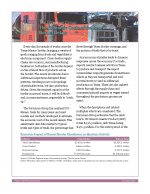The Economic Costs of the Recent Border Delays
Published on April 20, 2022

Every day, thousands of trucks cross the Texas-Mexico border, bringing a variety of goods ranging from fruits and vegetables to electronic equipment. Cross-border supply chains are common, and manufacturing facilities on both sides of the border depend on the efficient flow of products across the border. The recent slowdowns due to additional inspections disrupted these patterns, resulting in not only spoilage of perishable items, but also production delays. Given the strained capacity at the border in normal times, it will be difficult and, in many instances, impossible to “catch up.”
When the disruptions and related multiplier effects are considered, The Perryman Group estimates that the daily loss to US Gross Domestic Product (GDP) totals $996.3 million, with Texas losing $470.3 million. For the entire period of the slowdown, losses rise to an estimated $8.967 billion in GDP and the equivalent of 77,019 job-years for the United States and $4.233 billion in gross product and 36,330 job-years of employment in Texas. (A job-year is one person working for a year, though in this case it is primarily multiple individuals working for shorter periods.)
Mexico is a top trading partner not only for Texas, but also for the United States. Inefficiencies in the flow of imports and exports across the border leads to notable economic losses. While border security is certainly an issue that must be addressed, introducing artificial inefficiencies into an important, capacity constrained element of an already overly stressed national supply chain is a costly option.
For more details please refer to the full brief.
- Tags: Federal Reserve, border, impact analysis, Texas